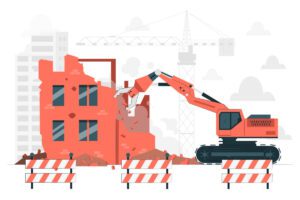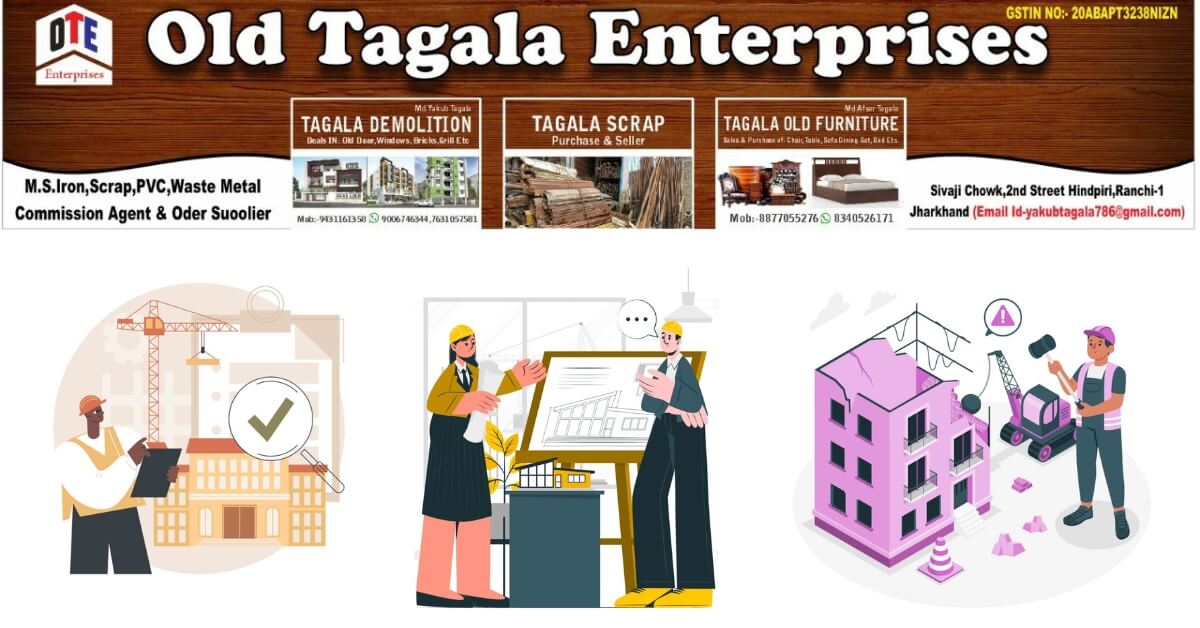Introduction
As urban development paves the way for the future, it often involves the dismantling of older structures to make room for modern endeavors. When it comes to old homes, the choice between deconstruction and demolition is pivotal. This decision doesn’t only impact the site but also carries environmental, historical, and even economic implications.
Deconstruction vs. Demolition: Making the Right Choice
In this article, we will know, what is deconstruction and demolition. And how to make a right choice when deciding to deconstruct or demolish the old home and building.
When faced with the decision of addressing historic homes, choosing between deconstruction and demolition carries significant implications. Deconstruction involves a meticulous process of carefully disassembling a structure to salvage valuable materials, preserving the historical significance of the property.

On the other hand, demolition entails the complete removal of the structure, often resulting in irreversible loss of architectural heritage.
While deconstruction is generally a more time-consuming and labor-intensive process compared to demolition, its benefits extend beyond preservation. It promotes local craftsmanship, generates opportunities for job creation, and can even yield tax incentives for historical preservation efforts.
Deconstruction: Preserving the Past
Deconstruction involves carefully disassembling a structure with the goal of salvaging reusable materials. This method is time-intensive and requires skilled labor, but it can be incredibly rewarding for preserving the history and character of a building.

Opting for deconstruction over demolition allows for the retrieval of antique materials, such as reclaimed wood, ornamental fixtures, and unique architectural elements. This not only honors the history of the home but also contributes to sustainable practices by reducing waste and promoting resource efficiency.
Benefits of Deconstruction:
- Material Reuse: Deconstruction allows for the salvage of valuable materials like wood, bricks, fixtures, and architectural elements, reducing waste and conserving resources.
- Historical Preservation: Older homes often have unique architectural features that can be preserved through deconstruction, contributing to the preservation of local heritage.
- Environmental Impact: Deconstruction minimizes the amount of waste that ends up in landfills, reducing the ecological footprint associated with demolition.
- Community Engagement: Deconstruction projects can involve the local community, providing opportunities for job creation and skill development.
- Tax Deductions: Donating salvaged materials to charitable organizations can result in tax deductions, providing an added incentive.
Demolition: Efficiency and Practicality
Demolition is a process that prioritizes efficiency and practicality in dismantling structures. It involves employing specialized techniques and machinery to safely and swiftly bring down buildings, and Home making way for new developments or repurposing the land. Efficiency is achieved through careful planning, strategic execution, and the use of modern equipment that minimizes disruption to the surrounding environment.

Practicality is a cornerstone of demolition, as it addresses structures that are unsafe, outdated, or no longer functional. Whether clearing space for urban renewal or removing hazardous materials, demolition provides a practical solution for repurposing land and ensuring public safety.
Demolition, on the other hand, involves razing the entire structure to the ground. This method is faster and more cost-effective but may not align with the goal of preserving historical elements.
Benefits of Demolition:
- Time Efficiency: Demolition is quicker than deconstruction, making it suitable for projects with tight timelines.
- Cost Savings: The reduced labor and time involved in demolition often lead to lower overall costs compared to deconstruction.
- Site Preparation: Complete demolition provides a clean slate for new construction, allowing for more flexibility in design.
- Structural Issues: In cases where the building is structurally compromised or poses safety risks, demolition might be the safer option.
Choosing the Right Approach

- Assess the Historical Value: If the home has significant historical or architectural value, deconstruction might be the better choice to preserve its legacy.
- Environmental Considerations: If sustainability and waste reduction are priorities, deconstruction aligns better with eco-friendly goals.
- Budget and Timeline: Consider your budget and project timeline. Demolition is usually quicker and more cost-effective, making it suitable for certain situations.
- Future Use: If you’re planning to rebuild on the same site, demolition might make more sense. If you’re aiming for a new design with historical elements, deconstruction could be the answer.
- Local Regulations: Research local regulations and guidelines that might influence your decision. Some areas might encourage deconstruction for historic preservation.
Demolition Project Management: Planning, Execution, and Challenges.
Conclusion:
The choice between deconstruction and demolition for old homes and buildings is a complex one, encompassing historical, environmental, and financial factors. By carefully assessing the value of historical elements, your project goals, and the resources available, you can make an informed decision that aligns with your vision and priorities.
Whether you opt for deconstruction to honor the past or choose demolition for a fresh start, your choice will leave an impact not only on the site but on the community and environment as well.
Other Interesting Posts To Read:
Demolition Waste Management: Embracing Recycling and Sustainable Practices
The benefits of donating unwanted items to charity or non-profit organizations
5 Reasons Why Recycling Should Be a Priority in Your Community
The importance of responsible disposal of electronic waste (e-waste)

1 thought on “Deconstruction vs. Demolition: Making the Right Choice”